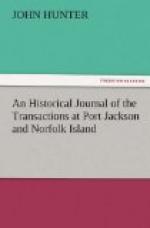The annual exports from Rio de Janeiro are, 3,200 arobes of gold, which are sent to Portugal, and of which the King has a tenth part; 6,000 cases of sugar, each weighing 40 arobes; 5,000 cases of rice, and 1,500 casks of rum, each cask containing eight almudas*.
[* An arobe is thirty-two pounds; an almuda, four gallons and a half.]
Before we left this port, we took on board the following seeds and plants, viz.
Coffee plant and seed, cocoa-seed, jalap, ipecacuhana, tamarind, banana, orange, lime, and lemon-trees, guava seed, prickly pear, with the cochineal in seed upon it, pomrose, grape, tobacco, and rice for seed.
[A table of the winds and weather, etc. etc. in the Passage from the Island of Teneriffe to Rio de Janeiro, Coast of Brazil, on board His Majesty’s Ship Sirius.] [The table is included in the HTML version]
Chapter II
September 1787 to January 1788
Anchor in Table-Bay.—Refreshments procured there.—Depart from the Cape of Good Hope.—Captain Phillip quits the Sirius, and proceeds on the voyage in the Supply.—The Sirius arrives in Botany-Bay.—Finds the Supply at anchor there.—Arrival of the Bussole and Astrolabe.— Leave Botany-Bay, and anchor in Port Jackson.—The Table of Winds, Weather, etc.
We had light and variable winds for the two first days after leaving Rio de Janeiro, then it veered round to the north-east, and freshened up, and was some times as far to the northward as north by east; we steered off east-south-east and south-east. In latitude 25 deg. 50’ south, the weather became dark and cloudy, with much rain and lightning all round the horizon, which shifted the wind to the southward, and the weather cleared up. On the 19th, we saw several Pentada birds. On the 29th, having had thick hazy weather during the night, some of the convoy had been inattentive to the course, and were found at day-light considerably scattered and to leeward; we bore down and made the signal for closing. Nothing worth relating happened this passage. On the 12th of October, as we were expecting every hour to make the land, the weather being hazy, with a strong westerly wind, at midnight we made the signal and brought to; at day-light we bore away and made sail, and at six o’clock saw the land, distant 10 leagues; at noon, the entrance of Table-Bay, at the Cape of Good Hope, bore east three leagues. At the distance of seven or eight leagues from the land, the Supply armed tender being ordered to wait for the sternmost of the convoy, Lieutenant Ball took that opportunity of sounding, and at the before-mentioned distance had 115 fathoms, over a black sandy bottom; and at five leagues distance he had 90 fathoms, sand with small stones. The water appeared, at a much greater distance, considerably discoloured, from which I think there is reason to suppose that the soundings from this part of the coast run farther off to the westward. We were all this time in the parallel of 34 deg. south. On the 14th of October, at five in the evening, we anchored with all the convoy in Table-Bay, Cape of Good Hope, and at sun-rise the next morning we saluted the fort with 13 guns, which was answered by the same number.




